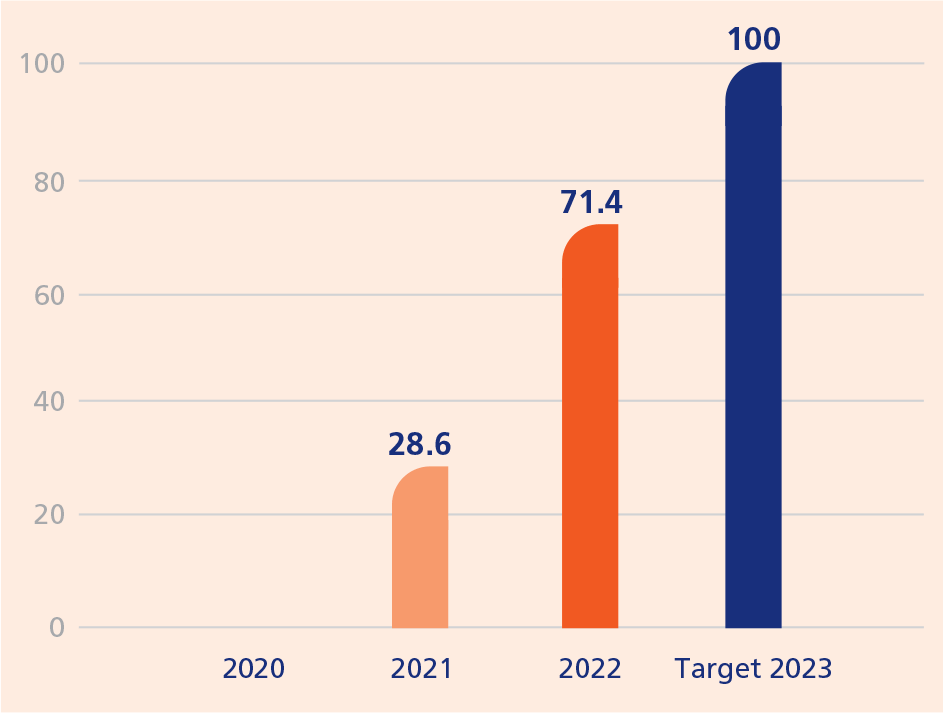3.4.3.2.2 The Group’s contribution to the creation of new industrial sectors
“France Relance” plan
The action provided for in the excell plan will be further strengthened and stepped up under the stimulus package. On 27 November 2020, the French government announced a sector support plan as part of the France Relance recovery plan, with €470 million earmarked for the nuclear industry.
GROUP KEY PERFORMANCE INDICATOR
EDF’s performance in respect of its “Development of industries” commitment is assessed on the basis of the rollout rate for EDF-backed support initiatives to promote nuclear industry skills insourcing and maintenance as part of the France Relance plan.
These support initiatives include the creation of a fund to assist SMEs and MSEs in the sector, the setting up of a Nuclear Industry University, support for students through the granting of scholarships, and funding for re-industrialisation and insourcing projects.
Achievement rate of supporting actions backed by EDF, encouraging relocation and maintaining nuclear industry skills (“France relance” programme) (in %)

This graph shows us the advisory actions carried out with customers as part of the energy support system (in nb).
2020 : -
2021 : 28.6
2022 : 71.4
Target 2023 : 100
3.4.3.3 Support in the context of redeployment of sites and professions
All employees affected by job cuts are given specific support. They benefit from specific schemes in terms of priority mobility (individual personalised support and financial support), external career plans and pre-retirement paid leave.
3.4.3.3.1 Declining activities and territories
Power plant closures: greater solidarity
Social dialogue
EDF continues with social dialogue during the various shutdown phases of power plants. In France, plant closures are the subject of consultations with staff representative bodies (1). The “business-specific” agreements cover production fleet closures and include dedicated measures to provide recognition and financial assistance.
Redeployment measures
EDF has committed to implement all means necessary to carry out exemplary closures and enable employees to consider new career prospects taking their individual aspirations into account. Plant closures are implemented with measures to redeploy employees within the Group and initiatives to develop new local economic activities, to offset the loss of jobs and tax revenues in the affected municipalities.
Fessenheim and Le Havre
Employees from the Fessenheim and Le Havre power plants (which closed in June 2020 and April 2021 respectively) are benefiting from social innovation measures to facilitate their redeployment within the Group’s regional or national entities. As of the end of 2022, 95% of Fessenheim and Le Havre employees had found another job within the Company.
Instruments to preserve local economic vibrancy: Social Bonds and Ecological Transition Contracts
EDF ensures to develop new local economic activities, to offset the loss of jobs and tax revenues in the affected municipalities.
Use of Social Bonds
EDF’s first Social Bond issue, totalling €1.25 billion, was made last year. The social purpose of eligible projects is support for SMEs that form part of EDF’s industrial fabric and provide job opportunities in localities where EDF is present. 100% of the funds raised will be used to support investment in areas with high levels of unemployment.
Use of Ecological Transition Contracts (CTE)
The Group uses Ecological Transition Contracts (contrats de transition écologique, CTE) as part of a consultative process bringing together local authorities alongside local NGOs and companies to refocus the local economy around sustainable, job- centred projects.
CleanTechBooster at Aramon
Following the signing of an Ecological Transition Contract, the Aramon coal-fired power plant in the Gard was replaced with a 5MWc photovoltaic power plant, and a local energy transition development plan called CleanTechBooster was implemented. Via the CleanTechBooster accelerator, 300 jobs were maintained, 38 jobs were created, and 138 start-ups were matched with big businesses or local authorities. Several projects were set up to develop air quality monitoring in nurseries or treatment of industrial wastewater via re-use systems.
(1) See section 3.5.3 “Social dialogue”.
